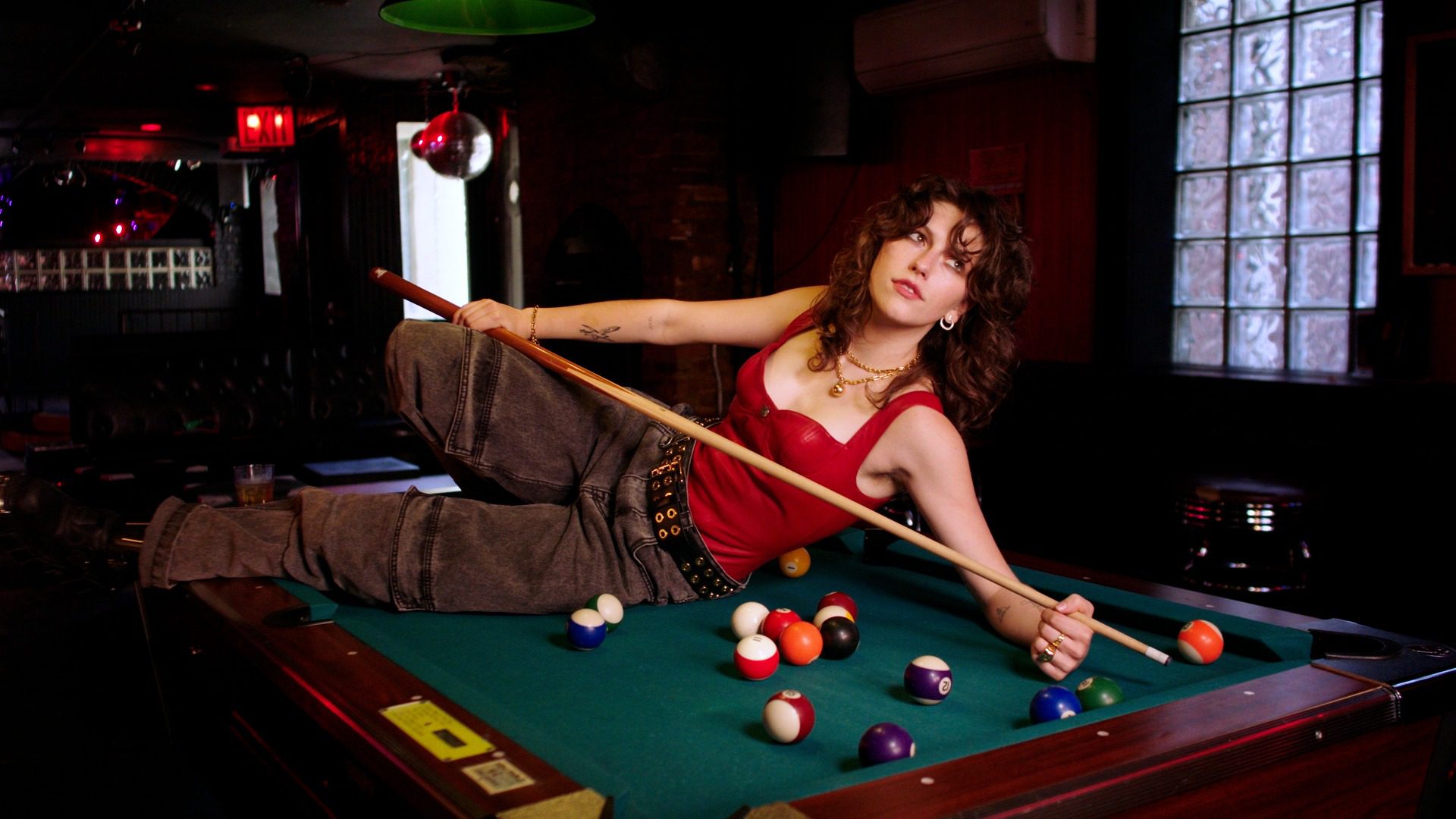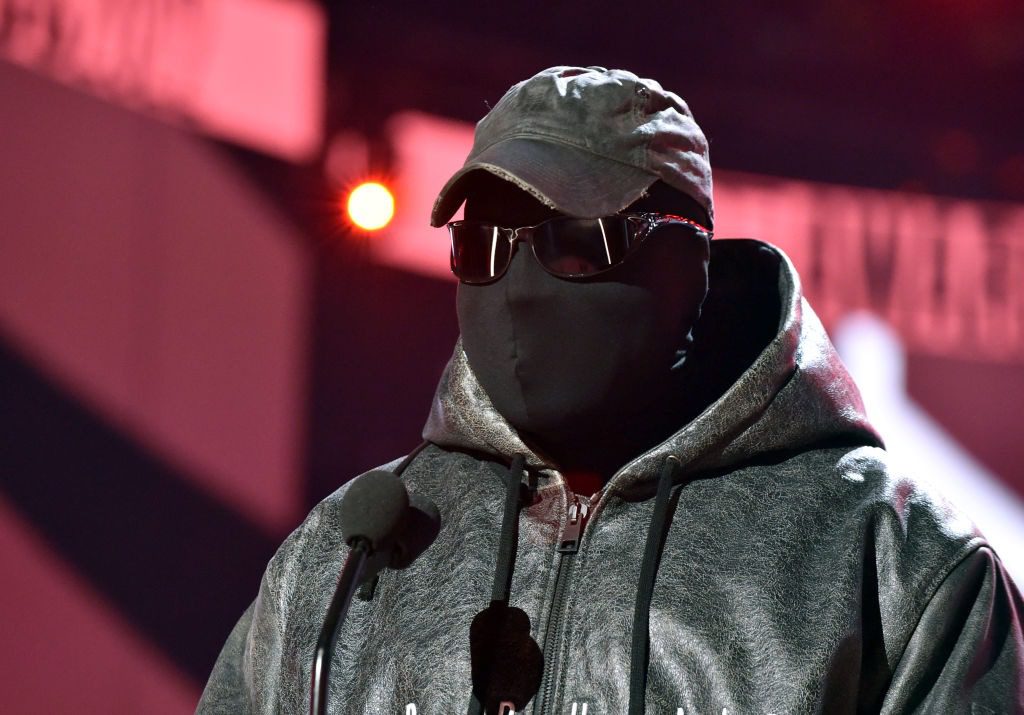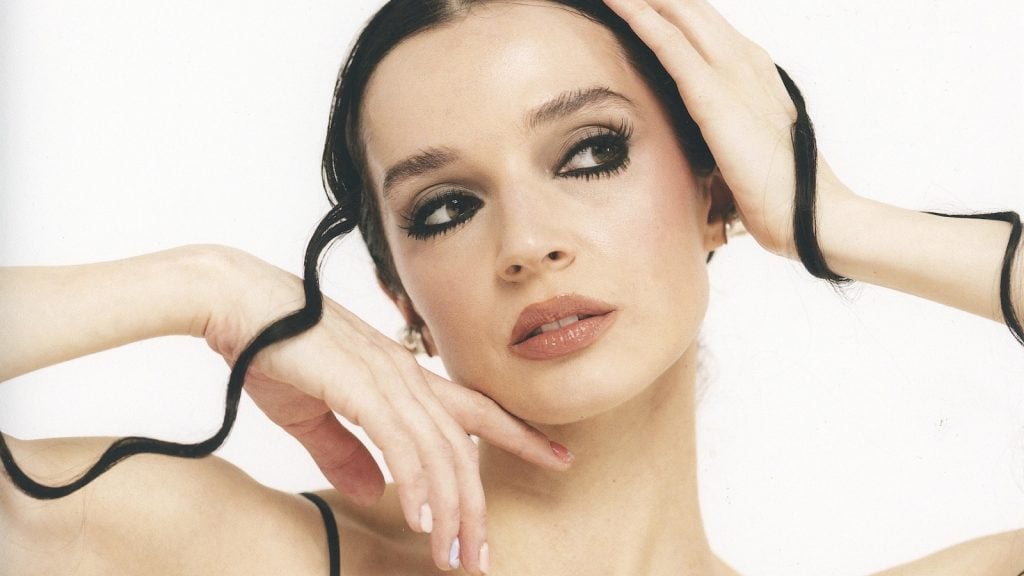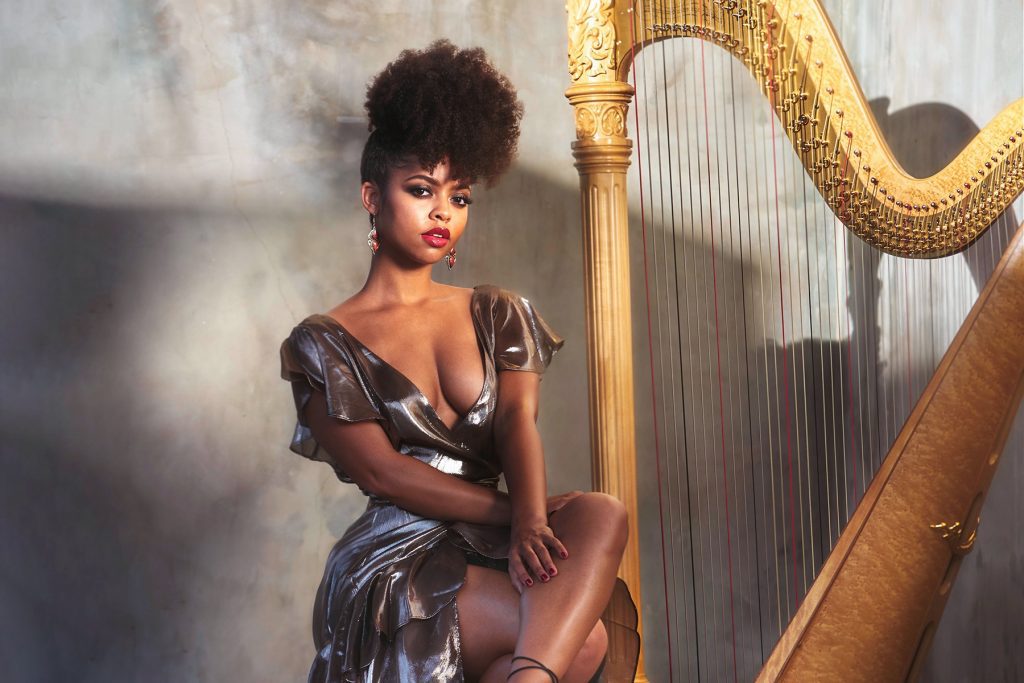
King Princess: An Untamed Pop Queen Arrives
King Princess: An Untamed Pop Queen Arrives
She's a rock star as purely savage as the times we live in — and with her new album, she’s getting wilder than ever
King Princess has a new song she can’t wait to talk about. It’s a breakup song that starts out soft and dreamy before erupting into a scorched-earth mid-Nineties rager with the biggest chorus she’s ever belted. But the description that really nails “Change the Locks” — the one that makes King Princess beam as she shares it — came from someone in the studio, who said it sounds like menstruating at Lilith Fair.
“I was like, ‘Cunt!’ That’s exactly what I’m going for!” the 23-year-old musician says. “It’s a journey.”
This is what it’s like to converse with Mikaela Straus, the indie-pop visionary behind King Princess. With her feathery, shoulder-length chocolate-brown hair and extensive knife collection, she exudes a rock-star persona as purely savage as anyone in her generation — she could be Marc Bolan reincarnated or a long-lost cousin of John Lydon, dropping brazen one-liners in between hits from her vape pen. She uses the word “cunt” in almost every sentence, so much that her publicist is worried her quotes will be unusable for this story. A story, by the way, that Straus feels she was born for.
blogherads.adq.push(function () {
blogherads
.defineSlot( ‘medrec’, ‘gpt-dsk-tab-article-inbody1-uid0’ )
.setTargeting( ‘pos’, [“mid-article”,”mid”,”in-article1″,”mid-article1″] )
.setSubAdUnitPath(“music//article//inbody1”)
.addSize([[300,250],[620,350],[2,2],[3,3],[2,4],[4,2],[640,250]])
;
});
“I remember specifically when it hit me that as a queer person, I could be in this magazine,” she says. “I remember reading Megan Fox’s cover, and she was talking about masturbating to girls. It was incredible to hear this woman talk about fucking and coming. I was like, ‘There you have it, folks! I could be in this.’”

It’s early April in Brooklyn, and Straus is on the cusp of completing her new album, Hold on Baby, out July 29. We’re at Mission Sound, her father Oliver’s studio in Williamsburg, the neighborhood where she grew up. Even though she partly lives in Los Angeles these days, she has a true New Yorker’s preference for her hometown. “I come back and I’m the person I’m supposed to be,” she says. “Nothing better than being stony baloney on the train.”
She describes the studio’s vibe as “shabby chic,” gesturing to the tattered, multi-colored kitschy couches around her. There’s one wall separating the studio and home (you can tell by the sign on the door that simply reads “Not the studio”), and classic rock memorabilia is everywhere, from the recent Get Back Beatles book on the coffee table to the 1978 Frank Zappa poster that resides above the toilet. A platinum plaque for “1950,” Straus’ breakthrough 2018 hit about queer love (“I hate it when dudes try to chase me/But I love it when you try to save me”), is framed on the wall.

Photographs by Gioncarlo Valentine for IndieLand.
Fashion Direction & Styling by Alex Badia. Hair by Rutger at the Wall Group. Makeup by Kabuki. Market Editor Lizzy Rosenberg. Assistant Stylist Kyle Rice. Jacket, Shirt, Pants Balenciaga. Cuffs & Necklace by Tiffany & Co. Ring by Celine.
Straus stands at a vintage Neve console, ready to play me some tracks off her laptop. She’s wearing an indigo Fiona Apple shirt from 1996 that was gifted to her by a fan — original Tidal merch by West Coast minimalist designer James Perse. She likes the shirt’s slim fit over her baggy jeans, a classic late Nineties pairing that’s back in style, but what the shirt really represents is how Apple has become one of her best friends in the industry.
“She’s been a really incredible North Star for me,” Straus says. They got to know each other after Straus covered “I Know,” the final song from When the Pawn…, in 2019, with Apple singing backing vocals. They ended up getting tattoos together the following year — Apple got a bolt cutter to mark the album she’d just made, while Straus picked a crowbar, from the lyrics to “I Know.”
“’So be it, I’m your crowbar’ is my favorite line ever written in music,” she says. “Like, I’m your tool that is used to pry you open. That is the most stunning, breathtaking sense of it, and so fucking sad. She’s a genius.”
blogherads.adq.push(function () {
blogherads
.defineSlot( ‘medrec’, ‘gpt-dsk-tab-article-inbody2-uid1’ )
.setTargeting( ‘pos’, [“mid-article2″,”mid”,”in-article2″,”mid-article”] )
.setSubAdUnitPath(“music//article//inbody2”)
.addSize([[300,250],[300,251],[620,350],[2,4],[4,2],[3,3],[2,2]])
.setLazyLoadMultiplier(2)
;
});
Straus didn’t stop with the tattoo. She was so moved by Apple’s words that she named a Hold on Baby song after it. “Crowbar,” like “Change the Locks,” is a co-write with the National’s Aaron Dessner, the scruffy multi-instrumentalist who added his indie folk sensibility to Taylor Swift’s Folklore and Evermore. It’s one of the quieter tracks on the album, with muted, twinkling instrumentation seamlessly carrying Straus to the finish line as she sings about a partner who’s “like a crowbar prying at the chip on my shoulder.”
“The idea behind that is being fucked up and young and not really taking care of myself or having any purpose other than selfishness and being crazy,” she says. “Having someone, or some creature, opens your heart to this idea that you don’t have to walk around with heaviness.”
Straus was just exiting her own angsty teens when she debuted four years ago with “1950,” a dreamy ode to Patricia Highsmith’s cult-classic lesbian romance novel The Price of Salt (known better to some as the basis for Cate Blanchett and Rooney Mara’s doomed onscreen affair in 2015’s Carol). The R&B slow burner caught the attention of Harry Styles, who tweeted the chorus “I love it when we play 1950” and immediately got 100,000 retweets. As of now, the song has nearly 20 million views on YouTube.
Some rising artists might have flinched under that pressure. Straus grinned and strapped her new fans in for the emotional rollercoaster that was Cheap Queen, her debut album that arrived a year later. The record showed Straus howling her woes across soulful grooves as if her insides were on fire, with song titles as bluntly literal as it feels to get your world shattered when you’re 19, like “Do You Wanna See Me Crying?” and “You Destroyed My Heart.”
Now Straus is in her longest adult relationship yet — with Quinn Wilson, who works as Lizzo’s creative director — and she’s a pretty happy person overall. (“Ish,” she corrects.) Like many songwriters before her, she found that this made it difficult to write.
“I was like, ‘What is my purpose?’” she says. “I’m not heartbroken; I’m not pissed at some girl. How do I write music if it’s not about getting back at someone?”

Bodysuit by DSquared. Belt by Michael Kors Collection. Necklace by Tiffany & Co. Bracelet and ring by Celine. Photographed on location at The Metropolitan in Brooklyn, NY.
Gioncarlo Valentine for IndieLand.
blogherads.adq.push(function () {
blogherads
.defineSlot( ‘medrec’, ‘gpt-dsk-tab-inbodyX-uid2’ )
.setTargeting( ‘pos’, [“mid”,”mid-articleX”,”in-articleX”,”mid-article”] )
.setSubAdUnitPath(“music//article//inbodyX”)
.addSize([[300,250],[300,251],[3,3],[620,350],[2,2]])
.setLazyLoadMultiplier(2)
;
});
In February 2021, Straus’ team booked her some sessions with Dessner at his home studio in upstate New York. “I was like, ‘Guys, I don’t know if I want to meet another man right now,’” she remembers telling them. “‘I don’t know if I can handle meeting anybody.’”
She was reeling at the time from the loss of her 89-year-old grandfather, whose funeral she’d just attended, and taking comfort in the constant presence of her pets — a menagerie that includes a two-year-old, 50-pound border collie named Raz, a cat, and several goldfish named after pop stars like Jazmine Sullivan, Adele, and Stefani Germanotta.
Her grandfather loved looking for owls in the woods, and after his death, she felt her connection to animals grow deeper. On the cover of Hold on Baby, she’s posed with a snowy barn owl. “She’s shrouding me with her wings, and I’m looking cunt and glam, obviously,” she says. “Prince had his doves. I think the owl is mine.”
First, though, she had to make the album. She ended up staying at Dessner’s cozy barn studio for a total of five days. She’d walk in the snow to his house on the property, and his wife would make her coffee before they got to work. One day, she lost a ring while playing fetch with Raz, and Dessner promised to find it after the snow melted. Six months later, she got a phone call. “His kids found it playing soccer,” she says. “He’s such an amazing man.”
There are moments in music that feel like an explosion of energy, when the instrumentation builds and the chorus hits you like a rush of wind to the face. Straus gets this euphoria from very specific songs — including Soundgarden’s “Black Hole Sun” — and she tries to chase it on Hold on Baby, a vibe she describes as “giving Nineties boy grunge.”
if(typeof(jQuery)==”function”){(function($){$.fn.fitVids=function(){}})(jQuery)};
pmc_jwplayer(‘jwplayer_FJHGvbYt_yTTJs9q5_div’,’yTTJs9q5′).setup(
{“vloc”:”auto”,”floating”:true,”playlist”:”https:////content.jwplatform.com//feeds//FJHGvbYt.json”,”ph”:2}
);
She sprinkles this feeling on “Too Bad” and “Cursed,” but it’s most intense on “Let Us Die,” which she describes as her “big-girl song.” In the chorus, she declares, “Drive the car right off the bridge and let us dive.” She co-wrote the track with Mark Ronson and Ethan Gruska, the latter known for his production work with Phoebe Bridgers. “We met and it was like we were the same tribe, same humor,” Straus says. “We joked that we would’ve been those friends in elementary school who were really competitive, but loved each other a lot and would do magic tricks and play in the woods. That’s our energy.”
Through her sessions with Gruska, Dessner, co-producer Dave Hamelin, and mixing engineer Shawn Everett, Straus felt Hold on Baby beginning to take shape. “All I’ve ever really wanted was to feel camaraderie in making music, and I started to feel that,” she says. But she emphasizes that first and foremost, it’s a King Princess record — she plays many of the instruments, and co-produced every track. “I’m at the helm of this ship,” she says. “Or else it wouldn’t be my music.”
blogherads.adq.push(function () {
blogherads
.defineSlot( ‘medrec’, ‘gpt-dsk-tab-inbodyX-uid3’ )
.setTargeting( ‘pos’, [“mid”,”mid-articleX”,”in-articleX”,”mid-article”] )
.setSubAdUnitPath(“music//article//inbodyX”)
.addSize([[300,250],[300,251],[3,3],[620,350],[2,2]])
.setLazyLoadMultiplier(2)
;
});
Take the silky horn section that floods out more than halfway through “Crowbar.” “I played those by hand on a Mellotron,” she says. “A full horn section, track by track. Shawn was like, ‘Bitch, I have spent so much time and money hiring horn players, and this whole time I could’ve just had you with a Mellotron?’ It’s the cheap queen within me. I can do it.”
One of the album’s highlights is “Winter Is Hopeful,” a sultry stunner written for Wilson, where she proclaims, “Quinn, Quinn, Quinn, Quinn, I love you.” Straus says she views their relationship in seasons, where “summer is really fucked for us,” while winter, especially in New York, is frigid, comforting, and hopeful.
Straus and Wilson began dating four years ago, after Straus messaged her on Instagram claiming she loved her work. “I made a little lie,” Straus says when we meet for avocado toast at the Standard in Manhattan earlier that week. “I did love her work, but I didn’t know it was her. So she thought it was business, and was really upset when she found out it wasn’t.”
Straus talks about Wilson in real life the same way she does in “Winter Is Hopeful” — she even fantasizes about their engagement. It involves animals, of course. “There’s a flock of owls by me,” she says. “I’m on a horse, riding through a field, and Quinn’s on another horse. The horses are riding to each other. We stick our fingers out as we pass and put the rings on each other.”
She pauses, then looks up from her iced coffee. “That’s going to take a lot of planning.”

Shirt, shorts, and belt by Miu Miu. All jewelry by Tiffany & Co.
Off the final 4 train stop in the Bronx, within 400 acres of white oaks, weeping beeches, and Eastern white pines, just a two-minute walk from Celia Cruz’s mausoleum, sits a tomb in the shape of an Egyptian funeral barge. In it lies Isidor Straus, the co-owner of Macy’s, who went down with the Titanic in 1912 along with his wife, Ida, one of the few women who chose to die with their husbands. (They are the elderly couple on the bed in James Cameron’s Titanic with water rising around them.)
The Straus’ grave is a mecca for Titanic diehards, but their great-great granddaughter doesn’t really give a shit. “You know where I will not be caught dead? There,” she says, deadpan, and very much still in Brooklyn. “I’d sooner die on a cruise ship than go to that cemetery.”
blogherads.adq.push(function () {
blogherads
.defineSlot( ‘medrec’, ‘gpt-dsk-tab-inbodyX-uid4’ )
.setTargeting( ‘pos’, [“mid”,”mid-articleX”,”in-articleX”,”mid-article”] )
.setSubAdUnitPath(“music//article//inbodyX”)
.addSize([[300,250],[300,251],[3,3],[620,350],[2,2]])
.setLazyLoadMultiplier(2)
;
});
Straus’ connection to history’s most famous maritime disaster caused immediate online backlash when amateur pop detectives discovered it via Google in 2019 — even when she clarified that she is far from a spoiled heiress to the Macy’s fortune. (The fact that her dad owns a modest studio didn’t help matters.)
“My family is so estranged on that side. I didn’t receive any coins,” she says firmly. “They’re salty people.”
And yet, she understands why industry plant accusations are so prevalent in music. “Fundamentally, people are frustrated by the socioeconomic state of the music industry, and the fact that opportunity is given to people who have more comfortability than [others],” she says. “So I totally get where it comes from. I’m just not that girl. I’m not going to front like I was some rich kid. There were tough moments, and there still are.”
Straus’ parents, Oliver and Agnes, divorced three years after she was born in 1998. Although she witnessed her parents fighting for years, she has a mature perspective on their separation. “They’re human, and they did the best they could,” she says. “I’m not a sob-story person. They definitely informed the person I am, and wanting to be better at conflict resolution is a result of that.”

Vest by Dsquared. Shorts by Calvin Klein. Necklace and bracelet by Tiffany & Co. Ring by Celine.
Gioncarlo Valentine for IndieLand.
Straus divided her time between parents, staying at her father’s studio on Wednesdays and weekends, where she did her homework (we’ll have to assume it wasn’t math, a subject Straus claims she was so terrible at she couldn’t “add numbers to numbers”). She wrote her first song, “Jackie the Dog,” at five years old, and was approached by Virgin Records when she was just 11; she declined, deciding she wasn’t ready.
“All I wanted to do was be in that fucking studio,” she says. “There’s photos of me butt naked with a microphone, standing on that table. The studio felt like a spaceship — everything lights up, every button can be pushed, and every knob can be turned. For kids, I think it’s the shit. It expands your brain.”
Other realms were more challenging for her. She rode horses as a kid, like her mom had, and played sports, in part because those activities helped her wrestle with questions of identity. “When you’re a little non-binary kid and you put on a uniform that’s neutral and you get to put your mind into one activity and not think about all the other shit you’re probably thinking about, it’s really healthy,” she says.
blogherads.adq.push(function () {
blogherads
.defineSlot( ‘medrec’, ‘gpt-dsk-tab-inbodyX-uid5’ )
.setTargeting( ‘pos’, [“mid”,”mid-articleX”,”in-articleX”,”mid-article”] )
.setSubAdUnitPath(“music//article//inbodyX”)
.addSize([[300,250],[300,251],[3,3],[620,350],[2,2]])
.setLazyLoadMultiplier(2)
;
});
Straus says she knew she wasn’t a girl before she knew she was gay. “It took me a long time to figure out the language,” she says. “Down to the word choices I use, it’s always reflective of the person I am. Whether that’s gender or sexuality, it’s always been a part of my music. Playing with it, discussing it, making jokes about it.”
Her parents found out she was queer when she was 13, after they read her texts. “It was so glaringly obvious, I don’t know how I could have been more clear,” she says. “But honestly, it was no thang. Some parents have that moment where there’s just that one blip of like, ‘But grandchildren!’ And then you’re like, ‘You can have [children] and be fully gay.’ And they’re like, ‘Oh! Never mind.’”
Straus attended the artsy Village Community School in the West Village, where she recalls calling tattooed teachers by their first names. In 2012, she applied to Avenues, a new high school that was awarding arts scholarships. After submitting a CD of her songs, she was accepted.
Straus moved to Los Angeles to attend USC Thornton School of Music, but lasted a year before dropping out to pursue her career full time. She even persuaded her bandmates to leave school and join her. “I was like, ‘Hey girls, let’s go!’” she recalls. “I was literally like, ‘I have a plan. I’m going to put this song out, and we’re going to hit the road. I believe in it, and it’s going to happen.’”
“1950” came out less than a year later, and on the same day her guitarist quit out of frustration that the band wasn’t going anywhere, Straus got a meeting with Ronson. It’s no surprise that the two immediately hit it off — Ronson is a fellow New Yorker with his own family ties to the music industry, along with experience producing for some of pop’s loudest personalities, from Amy Winehouse to Lady Gaga to Adele. Following a dinner Straus jokingly describes as a “first date,” the producer promptly signed her to his Columbia Records imprint, Zelig.
“He allowed me to be me,” she says. “And he saw the value in that, instead of trying to be like, ‘Well, if you did this and this…’ He probably felt the same way about the other people he’s worked with. Amy was Amy, and he was there to help.”
blogherads.adq.push(function () {
blogherads
.defineSlot( ‘medrec’, ‘gpt-dsk-tab-inbodyX-uid6’ )
.setTargeting( ‘pos’, [“mid”,”mid-articleX”,”in-articleX”,”mid-article”] )
.setSubAdUnitPath(“music//article//inbodyX”)
.addSize([[300,250],[300,251],[3,3],[620,350],[2,2]])
.setLazyLoadMultiplier(2)
;
});
Cheap Queen arrived in fall 2019, containing gems like “Isabel’s Moment” and “Hit the Back” (the latter of which she’d like to note is about Wilson, not about her ex-girlfriend). She says now that she slipped into a hyper-feminized persona on that album — on the cover, she’s laying on her side with her head in her hand, sporting exaggerated makeup — almost as a way to mask behind her sudden fame.
“When I did Cheap Queen, I was this kid dealing with ‘1950’ popping off and my life changing, and I was fucking terrified and insecure,” she says. “Cheap Queen was my armor, and now I don’t need it. I got rid of the armor.”
After that morning at Mission Sound, Straus and I walk to lunch in Williamsburg, passing by her old haunts. She’s already admitted she trusts no one from Los Angeles and can’t drive, but this is where her inner New Yorker truly comes out. She points to McCarren Park, where she played soccer as a kid. Then she spies the apartment where an old hook-up used to live.
“She had a boyfriend, and he was a DJ,” she says casually. “I told him straight up, ‘I will fuck your girlfriend if you disrespect me.’ And then I did. He started crying.”
As she continues walking Raz, an ad for Jell-O shots in the window of a bar sparks another memory from a couple of months ago. “I was in Dallas at my favorite gay club, called the Round-Up, and that was my dinner,” she says proudly. “I had about seven to 12 [shots]. Delicious.”
We sit down outside the pub Allswell, where Straus orders a crispy chicken sandwich to soak up the alcohol from the night before. Raz jumps onto her lap, the yin and yang charm on her collar dangling as she begs for scraps.
Straus will tour behind Hold on Baby this summer, and she’s determined to take her 90-year-old grandmother to her Radio City Music Hall show in October. “Nana went to Terminal 5,” she says of her 2019 show. “She stood the whole time and raged. ‘Fuck this wheelchair, I’m standing!’”
Earlier this year, she opened for Kacey Musgraves alongside Muna — the queer trio, signed to Phoebe Bridgers’ label Saddest Factory, who have joined Straus in breaking down doors for acts who defy the standard pop-star rules about gender and sexuality. “Kacey made a conscious decision to play to her fan base and bring out people that were reflective of what the audience looked like,” Straus says. “I thought that was a really fucking cool move.”
blogherads.adq.push(function () {
blogherads
.defineSlot( ‘medrec’, ‘gpt-dsk-tab-inbodyX-uid7’ )
.setTargeting( ‘pos’, [“mid”,”mid-articleX”,”in-articleX”,”mid-article”] )
.setSubAdUnitPath(“music//article//inbodyX”)
.addSize([[300,250],[300,251],[3,3],[620,350],[2,2]])
.setLazyLoadMultiplier(2)
;
});
Then she gets frustrated, thinking about the still-low percentage of out queer artists in the music industry. “It’s still not the norm,” she says. It bothers her that LGBTQ artists are reductively grouped into playlists because of their sexuality or identity, even if their music sounds nothing alike. (To take just one example: Out Now, a Spotify playlist with hundreds of thousands of followers, groups her recent single “For My Friends” — a synthy, sparkly ode to her comrades — with wildly different songs by Orville Peck, Brothers Osborne, and Rina Sawayama.)

Jacket, shirt, and pants by Balenciaga. Cuffs and necklace by Tiffany & Co. Ring by Celine.
Gioncarlo Valentine for IndieLand.
“White Male Pop, as a playlist,” she quips. “Could you imagine? It would essentially be the same thing, to do that. ‘Look at all these people grouped together. Oh my god, aren’t they amazing? Here’s their playlist!’
“We’re still the minority,” she concludes. “We’ve got to unify. That’s my biggest thing — the unification of queer people. We’ve got each other.”
Straus pauses to observe the New Yorkers around her. She laughs at a driver who chaotically reverses their Camry in the middle of Bedford Avenue, then notices a woman at a nearby table has her head tilted up to the sky with her eyes closed. “I think this woman is trying to do photosynthesis,” she says.
Straus has been getting noticed on the street more these days. “It’s been a lot of really sweet, positive messages from the gays,” she says. “This old man stopped me on the street today and was like, ‘I love your work.’ I was like, ‘Oh! Reaching different demographics!’”
This happens most often in her hometown, which makes her proud. “I feel like New York, for whatever reason, claims their people,” she says. “And I’ve always felt so much love here.”
In a moment like this, it’s hard not to feel like she’s taking her rightful place in a long lineage of glamorously disheveled downtown rebels — people like Lou Reed, Patti Smith, and David Bowie. Maybe the best comparison, with her unfadeable bravado and hair perfectly out of place, is a Julian Casablancas for a new generation of LGBTQ kids.
“That’s my goal,” she says, smiling. “Just in a trench coat.”
blogherads.adq.push(function () {
blogherads
.defineSlot( ‘medrec’, ‘gpt-dsk-tab-inbodyX-uid8’ )
.setTargeting( ‘pos’, [“mid”,”mid-articleX”,”in-articleX”,”mid-article”] )
.setSubAdUnitPath(“music//article//inbodyX”)
.addSize([[300,250],[300,251],[3,3],[620,350],[2,2]])
.setLazyLoadMultiplier(2)
;
});




